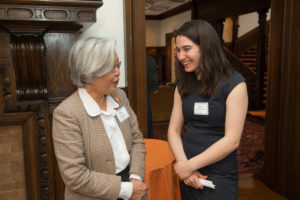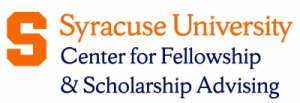Luce Finalist Lily Fein (’16) Reflects on the Application Process

Dr. Ruth Chen and Lily Fein chat during CFSA’s 2016 Recognition Reception. Dr. Chen advised Lily as she prepared for the final interview.
In February, Lily Fein traveled to New York City as a finalist to the Luce Scholars Program. She mingled with fellow finalists and members of the selection committee — prominent journalists, academics, artists, lawyers, and diplomats — at a cocktail party before the final interview. With majors in ceramics and history of art, Lily was interested in Japanese ceramic tradition, and applied to the Luce Scholars Program to explore this tradition. Her experience in New York City introduced her to professionals and students who share her interest in Asia.
The Luce Scholars Program seeks to introduce young, high-achieving leaders to Asia. The program provides professional placements, stipends, and language training for one year in Asia for a small cohort of young professionals, recent graduates, and graduate students with limited exposure to the region.
Although she was not ultimately named a Luce Scholar, Lily was energized by the process and will reapply. Lily also plans to apply to other prestigious awards to support an experience abroad integral to her artistic growth. She is in contact with CFSA as she starts her applications this summer. Lily is a Windgate Scholar at The Bray in Helena, Montana.
CFSA interviewed Lily about her experience applying to the Luce Scholars Program during the 2015-2016 application cycle.
How did you learn about the Luce and why did you decide to apply?
I learned about the Luce Scholars Program through a friend in the Honors Program who knew of my interest in Asian ceramics. I applied because I wanted to gain insight into the presence and role of craft in Asia. Further along in the application process I also became enamored by the uniqueness of the program in that it focuses on facilitated tailored placements for each scholar. I found this approach fitting, given my particular interest in ceramics and history of art.
What was the application process like?
The application process was one of constant re-writes. I cannot emphasize enough how vital it was for me to begin my application over the summer, and to work through many drafts.
Close reading and working with Jolynn Parker on each component brought me closer to articulating why I was a good fit for the program. Creating a clear picture of myself in this particular context inadvertently informed and affirmed my career and artistic goals. I learned many things during this application process, but most significant for future applications was understanding the importance of revising drafts until they are as close to a genuine reflection of yourself as possible. The resulting application is something that you can feel proud of, but the process of watching the documents become more true to yourself is most surprising and informative, and it proves the value of devoted and steady work.
Although you didn’t ultimately win the award, did you learn anything through the application process?
When I initially heard that I did not win the award I was upset. However, over time I grew to recognize the positive effects of rejection. I was honored to even be considered among a group of finalists who are doing amazing work in their fields, and I am inspired by their passion and that of the selection panel. I made connections in the finalist round that will reach beyond the Luce Scholars Program, as I was made aware of other competitive scholarships that are fitting for my work. I also learned through rejection that determination is incredibly important — the act of picking oneself up after rejection can lead to a more impassioned and compelling application in the future. Being rejected reaffirmed my desire to participate in the program, and I plan to reapply.
How did you work with CFSA?
I worked with Jolynn Parker almost weekly to go over drafts of my application. After being notified that I was a finalist, Jolynn organized several mock interviews and a mock cocktail party to simulate the experience that I would go through during the selection process in NYC. This preparation felt incredibly necessary and helpful for the actual interviews.
What advice do you have for future applicants?
To begin working on the applications early! It seems that the more time and thought that you put into the process, the greater success you will have.
